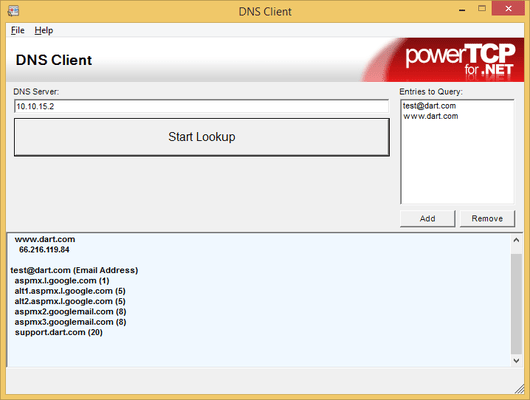PowerTCP Sockets for .NET Releases
Released: Nov 5, 2024
Updates in V6.1.1.0
Fixes
- A problem with licensing the component for runtime has been fixed.
Released: Mar 21, 2023
Updates in V6.1.0.5
Features
- Improved Microsoft Visual Studio Integration.
- Support for Microsoft .NET Framework 3.5 has been dropped and a minimum of .NET Framework 4.5 is now required.
- Licensing has been refactored.
Released: Dec 21, 2022
Updates in PowerTCP Sockets for .NET
Features
- Added support for Microsoft .NET 7.
Released: May 13, 2022
Updates in PowerTCP Sockets for .NET
Features
- Added support for Microsoft Visual Studio 2022.
Released: Dec 16, 2020
Updates in V4.5.7.2
Fixes
- Fixed a minor compatibility issue so that Dart.Sockets.Standard.dll can be used with .NET 5.0.
Released: Apr 30, 2018
Updates in V4.5.4.0
Features
- Added support for .NET Standard 2.0 and .NET Core 2.0.
- New .NET Core 2.0 sample projects, referencing the Dart.Sockets.Standard dll.
Released: Mar 8, 2017
Updates in V4.5.3.0
Features
- Adds support for Visual Studio 2017.
Released: Oct 18, 2016
Updates in V4.5.2.0
Fixes
- An issue where requesting less bytes than what is available when reading asynchronously and using ssl could potentially result in hangs until another socket operation is performed has been resolved.
- ClientSecurity.TargetHost will now use Session.RemoteEndPoint.HostNameOrAddress if TargetHost is not populated per current documentation.
- IPv6 Ping reply addresses are now reported correctly.
Released: Jun 12, 2014
Updates in this release
Updates in V4.5
- Added IPV6 address resolution support to the DNS component.
- Asynchronous, awaitable method overloads added to the TCP and UDP classes.
- Improved support for CAS level 2 applications in medium trust environments.
Released: Mar 10, 2011
Updates in this release
Updates in V4.4
- A new DNS component that enhances what is available in the .NET Framework. Lookup MX records, select the DNS server to use, and specify local endpoint to bind to.
- Connect methods have been updated to take a serializable Session object as a parameter, facilitating the saving of state information within an application.
- AuthenticateClient and AuthenticateServer methods have been updated to take a serializable Security object as a parameter.
- ReadToDelimiter, ReadToCount and ReadToEnd...
![]()
![]()
![]()
![]()
![]() (2)
(2)






